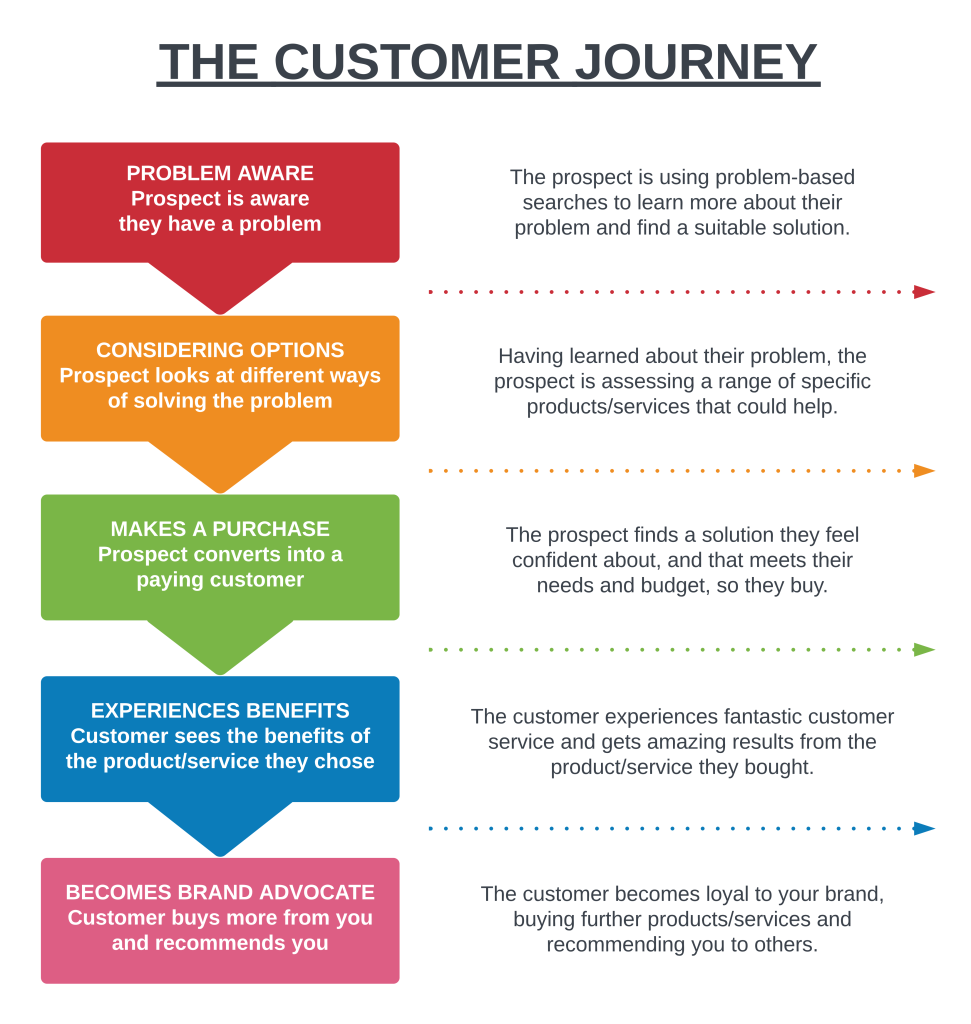Blogging is an investment
Blogging for business is an investment. You do it for returns.
But what kind of returns can you expect?
In short, it all depends on your goals for the blog, what you want it to achieve for your business and what calls to action (CTAs) you’re using. Your CTAs should be appropriate for each piece of content, but they could encourage readers to read more content, subscribe to your mailing list or visit your sales pages.
As I always say: the role of content is not to sell, but to help your customers buy. It’s not supposed to be a sales pitch — but if it gives your audience the lightbulb moment, information or inspiration they need, there’s no reason why it can’t result in sales or new enquiries.
Blogging is a long-term strategy
Blogging isn’t like advertising, which delivers big results quickly. Or sales pages, which are written specifically to convert readers into customers. So if you need substantial results — like, yesterday — it probably isn’t the best approach for you right now.
Blogging is a long-term strategy that needs consistent effort over time. If you want to see results, you need to commit to the process — and be prepared to wait for them.
But, if you do it properly, the results will be worth waiting for. And you’ll get so much more than just sales and enquiries.
Curious to find out what? Then keep reading, my friend, and prepare to be enlightened!
What results can you expect from blogging?
Here are some of the amazing results you can get from blogging.

More reach
Blogging can help you reach more of your target market in two different ways.
1. Content to target people at all stages of your customer journey
Unlike your website, which focuses mainly on the people who are ready to buy, your blog can target people at all stages of the customer journey. From those who’ve just realised they have a problem, to those who are considering their options, to those who’ve already bought.

2. Content that can be repurposed for different audiences
While some of your audience might enjoy reading, some might prefer video, audio or something more visual. Catering for different tastes can extend your reach even further.
Blog posts are usually the most detailed form of content, so they’re often the easiest to break down for other formats. You can then share this repurposed content on your other channels.
For example, the content from one blog post could be repurposed into:
- Statistics for an infographic
- Nuggets for social media posts
- A discussion topic for a podcast
- Information for a video demonstration.
Increased visibility on the SERPs
Blogging allows you to target more SEO keywords. This gives you more chances of ranking on the search engine results pages (SERPs) where you’ll become visible to a wider audience.
When I’m writing content, I’m always aiming for the top of Google. I might not always get you there — and I can’t promise you I will — but you have to aim high if you want to rank high, right?
More traffic to your website
The more you appear on the search engine results pages (SERPs), the more likely you are to get clicks. Every click drives more traffic to your website.
Increased brand awareness
When people start seeing your content on the SERPs and clicking on it, this will boost your brand awareness. And when they click through and start engaging with your content, they’ll become more familiar with your brand.
More engaged readers
Understanding your readers and creating the content you know they want to see is the best way to attract them to your website and keep them engaged.

They might come to read one blog post, but there are always opportunities to engage them further. Where you direct them will depend on the piece of content and where it fits into your sales funnel.
For example, it could be by pointing them to further related content, your email list or the sales pages for the products/services they’ve been reading about.
More subscribers for your email list
If you’re posting valuable content your audience is interested in, some will be keen to join your email list so they can consume more of it. When they’re subscribed to your email list, you’ll have a further opportunity to engage and sell to them.
More lead magnet downloads
If you have a lead magnet for download — paid or unpaid — your blog could be a good place to promote it.
In the past, I’ve written blog posts specifically to present lead magnets and encourage downloads. But some posts can be a natural lead-in to introduce the download and the benefits of signing up for it.
More inbound links
Inbound links typically come from other creators who rate your content, find you trustworthy and see you as an authority on your subject.
For you, this means more backlinks, which should afford you more kudos from Google. In turn, this can increase your page/domain authority, which will help you in the rankings.
More leads for your business
Not just more leads, but more relevant and better quality leads.
People who’ve taken the time to read your content and who’ve learned from your expertise will understand the value you’re offering and will be more interested in buying from/working with you specifically.
This makes these leads worth far more than prospects who are just price shopping or contacting you on the off-chance that you might be able to help them.
More paying customers
Not just more paying customers, but more happy customers. Because, before they became customers, they will have had the chance to read your content and make a more informed purchasing decision.

Happy customers are the best kind of customers. They’re the ones who’ll leave you good reviews and become advocates for your brand. They’ll recommend you to other people they know, they’ll stay loyal and engaged — and will most likely buy from you again.
More chances to demonstrate E-E-A-T
E-E-A-T stands for Experience, Expertise, Authoritativeness and Trustworthiness. That’s a mouthful, isn’t it? But what exactly is it?
These are all things that appear in Google’s Quality Rater Guidelines. They’re an indication of how Google rates and ranks content on its platform — but they’re also important to your prospects.
Blog content is a good way to demonstrate all these characteristics, earning kudos and trust.
Competitive advantage
Answering your audience’s questions — and doing it well — will give you a distinct advantage over companies that aren’t investing in their blog or that aren’t using it as they should be.
Customer insights
You can use the feedback from your blog posts to help you make improvements, sharpen your marketing messages and create better content.

For example, feedback may highlight:
- Pain points and frustrations
- Suggestions and ideas
- Positive experiences
- Areas of confusion
- Wants and needs
- Sales objections.
Better customer retention
Creating content for your existing customers will help keep them informed, engaged and loyal to your brand. It will give you opportunities to introduce them to new products/services that might benefit them. And it can be a platform to sell upgrades, add-ons and customisation options.
More suitable job applicants
If you’re recruiting, your blog can be a great place to post about your:
- Company culture
- Employee benefits
- Vision, values and ethics
- Career development opportunities
- Working environment and conditions.
This will give potential employees a good idea of what it will be like to work with you before they decide to apply. And it means you’ll be more likely to attract applicants who are a better fit for your company.
Want better results from your blog?
Maybe I can help you get them.
I’m Jenny Lucas, a freelance copywriter, content strategist and content writer based in Leicester, UK.
I started blogging for my employer’s company back in 2009. The company was losing money and I wanted to do something that would help generate some new leads.
With weekly blog posts, that I optimised for search and shared on our social media platforms, I created a new revenue stream and a source of new enquiries.
And I could do the same for you.
To find out more about my content services, head over to my content writing page >>
Or get in touch to discuss your needs.

You might also like…



